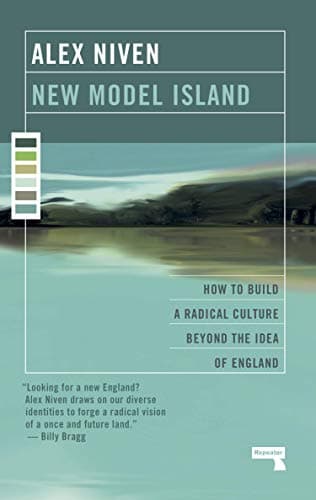
Book Review Summary: New Model Island: How to Build a Radical Culture Beyond the Idea of England
Introduction
In the early twenty-first century, "Englishness" became a hot topic. A surge of art exhibitions, pop albums, and coffee table books emerged, all attempting to recover England's lost national soul. However, Alex Niven, in his provocative book "New Model Island: How to Build a Radical Culture Beyond the Idea of England," argues that England is a country that does not and perhaps should not exist in any essential sense. Niven advocates for a renovated model of culture and governance for the islands, tearing apart the map of the British Isles and envisioning a fluid, dynamic version of regionalism. In this article, we will delve into the book's main ideas, analyze readers' views, and summarize the reasons for both recommending and not recommending this thought-provoking work.
About Alex Niven
Alex Niven is an English writer, poet, editor, and former musician. He is known for his engaging writing style and his ability to combine polemic and memoir in his works. Niven's background in music and his experiences with the indie band Everything Everything have influenced his perspective on culture and identity. His previous works include "Folk Opposition" and a study of the Oasis album "Definitely Maybe." As a lecturer in English Literature at Newcastle University and an editor at Repeater Books, Niven continues to contribute to the literary world with his insightful and thought-provoking ideas.
Analysis of Views
- Engaging with Nationalism: Many readers found the book engaging and appreciated Niven's exploration of nationalism in terms of regional diffusion. They appreciated how Niven challenges the idea of "Englishness" as a hollow identity lacking substance outside of London.
- Deconstruction of Identity: Readers were particularly intrigued by Niven's deconstruction of English identity, its sources, and ideologies. They found it thought-provoking to see how Niven interweaves personal experiences and historical context into his analysis.
- Blend of Personal and Political: Readers praised the book for its unique blend of personal, political, and historical elements. They enjoyed how Niven brings in his personal experiences to provide a relatable point of identification, making the book more engaging than a dry academic exercise.
- Future-Oriented Vision: Several readers appreciated the book's forward-looking perspective, envisioning a future where regional strength and autonomy lead to a fairer future. They found it refreshing to see a radical vision of place and identity within left-wing thought.
- Lack of Concrete Plans: Some readers felt that the book lacked detailed plans or a clear political agenda. They would have liked to see more concrete proposals for how regional governance could be implemented and how it could be presented as a political priority to voters.
Reasons for Recommendation
- Innovative Perspective: Readers recommend "New Model Island" for its innovative perspective on national identity and its exploration of regionalism as a potential alternative to outdated nationalisms. They appreciate Niven's ability to challenge conventional ideas and offer a fresh perspective on the future of England and the British Isles.
- Engaging Writing Style: The book's engaging writing style, combining personal anecdotes with intellectual analysis, makes it an enjoyable read for many readers. Niven's ability to blend conversational language with academic rigor keeps readers engaged throughout the book.
- Thought-Provoking Content: Readers find the book thought-provoking, particularly in its deconstruction of English identity and its exploration of regional strength and autonomy as a basis for a progressive political project. They appreciate the book's ability to spark critical thinking about the nature of national identity and the potential for radical change.
Reasons for Not Recommendation
- Lack of Concrete Proposals: Some readers feel that the book lacks concrete plans or proposals for implementing regional governance or presenting it as a political priority to voters. They find it frustrating that there is no clear roadmap for achieving this vision, which limits their ability to fully endorse the book's ideas.
- Shallow or Speculative Theoretical Points: A few readers find certain theoretical points in the book shallow or speculative, feeling that they lack depth or substance. They believe that these sections detract from the overall quality of the book and make it less compelling for those seeking more concrete ideas and solutions.
Conclusion
"New Model Island: How to Build a Radical Culture Beyond the Idea of England" by Alex Niven offers a provocative exploration of national identity and regionalism in England and the British Isles. Through a blend of personal anecdotes, literary analysis, and political theory, Niven challenges conventional ideas about Englishness and advocates for a renovated model of culture and governance that prioritizes regional strength and autonomy. While some readers appreciate the innovative perspective and engaging writing style, others feel that the book lacks concrete proposals or suffers from shallow theoretical points. Overall, "New Model Island" sparks critical thinking about national identity and offers a thought-provoking vision for a future beyond the constraints of traditional nationalism.